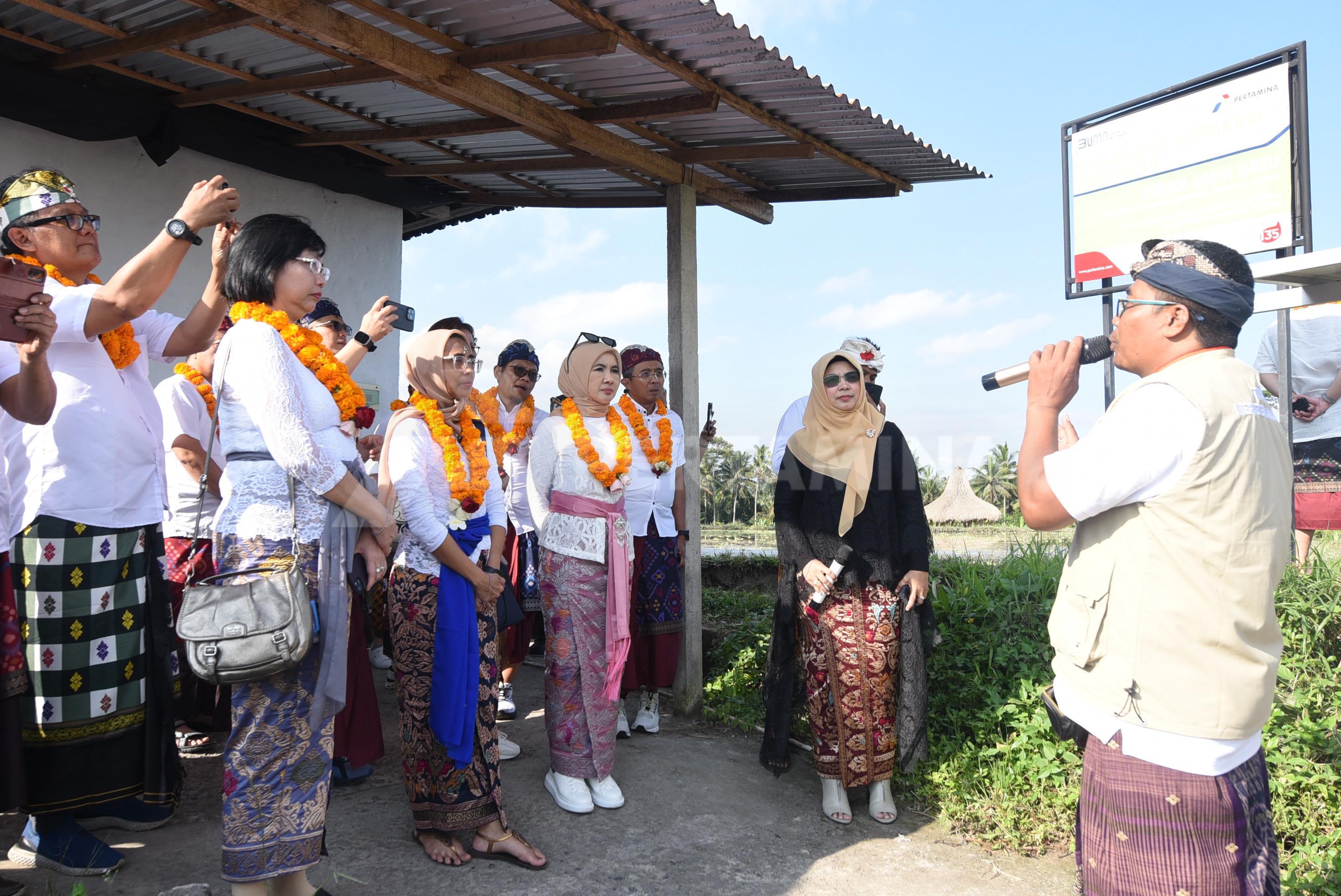
Commitment to Develop DEB, Director of Pertamina Invites Media Editor-in-Chief to Visit Keliki Village
Bali, June 23, 2024 - PT Pertamina (Persero) is committed to developing the Desa Energi Berdikari (DEB) program to support the Net Zero Emission 2060 target and accelerate the transition to clean energy. It was demonstrated by inviting 33 editors-in-chief of mass media to directly observe DEB at Keliki Village, Ubud, in Gianyar Regency, Bali, on Friday, June 21.
President Director of PT Pertamina (Persero), Nicke Widyawati, with national editors-in-chief, directly inspected the clean energy use generated by solar PV to supply energy for Subak Lauh Batu. Along with Pertamina Holding and Subholding management, they also spread organic fertilizer. Additionally, the editors-in-chief were invited to see firsthand the waste processing facility based on renewable energy and meet Pertamina’s fostered MSMEs.
Keliki Village has become a globally recognized pilot project for village-based clean energy development. Keliki Village has been visited by world delegations, including G20 countries participating in the 2022 G20 Energy Transition Working Group (ETWG), the 2023 ASEAN Energy Ministerial Meeting, the 2023 visit by the US Deputy Secretary of Energy, and the Southeast Asia Youth Energy Forum (SAYEF).
Clean energy in Keliki Village, used for running irrigation systems, waste processing, lighting, and more, has boosted the local economy by increasing food production, particularly rice. The community-managed land, using the subak system from spring water with irrigation from upstream to downstream, faces challenges in water supply during the dry season.
Furthermore, the clean energy used for waste management at the TPS3R facility can process 3-4 tons of waste per week into compost fertilizer for local agriculture.
The positive environmental impact of the DEB Keliki program includes reducing emissions by 36,750 kg CO2eq per year.
VP of CSR & SMEPP of Pertamina, Fajriyah Usman, stated that DEB Keliki is one of Pertamina's Social and Environmental Responsibility (TJSL) programs to support its role in leading the energy transition and achieving the NZE 2060 target.
“Pertamina, together with the community and local heroes, built seven solar-powered water pumps for irrigation,” Fajriyah said.
Regarding its management, Fajriyah added Pertamina entrusted the Keliki Village-Owned Enterprise (BumDes). To date, renewable energy in Keliki Village benefits 1,200 households.
Fajriyah further mentioned that to ensure the program’s sustainability and economic and energy independence, the digital marketing business became the focus activity involving 25 youths who have created 15 MSMEs through partnerships, producing packaged products and compost fertilizer.
The program is continuously developed to have a broader impact, including educating children in early childhood education centers, kindergartens, and elementary schools in Keliki regarding the waste impact on ecosystems, waste processing, and clean energy use.
BumDes Chair of Keliki, I Wayan Sumada, expressed his appreciation to Pertamina for transforming Keliki into an independent energy village.
“Pertamina is deeply integrated into Keliki Village. In the fields, at schools, and in waste processing, Pertamina is everywhere,” I Wayan Sumada said.
Since the introduction of solar-powered water pumps and compost fertilizer from waste processing, the organic rice harvest in Keliki village has increased from 5 tons to 8 tons per hectare per harvest, above the average of 7 tons per hectare.
Another environmental benefit is training 30 housewives to produce eco-enzymes, a catalyst to speed up compost formation, resulting in fertilizer cost savings of IDR 4.3 million per cycle.
Vice President of Corporate Communication of Pertamina, Fadjar Djoko Santoso, revealed that Pertamina has developed DEB in 85 locations across Indonesia.
“The DEB program by Pertamina has successfully reduced carbon emissions by 729,127 tons CO2eq per year,” Fadjar said.
Pertamina, Fadjar added, is developing renewable energy by utilizing five types of renewable energy: solar power, methane and biogas, micro-hydro, biodiesel, and hybrid energy from solar and wind.
“The DEB program will continue to be developed to meet the increasing demand for clean energy,” Fadjar added.
Nationally, DEB has produced 324,039 Wp (solar power), 609,000 m3/year (methane gas), 16,500 Wp (hybrid/solar & wind), 28,000 watts (micro-hydro), and 6,500 liters/year (biodiesel).
Pertamina, as a leading company in the energy transition, is committed to supporting the Net Zero Emission 2060 target by continuously promoting programs that directly impact the Sustainable Development Goals (SDGs) achievement. All these efforts align with Environmental, Social & Governance (ESG) implementation across all Pertamina's business lines and operations.**